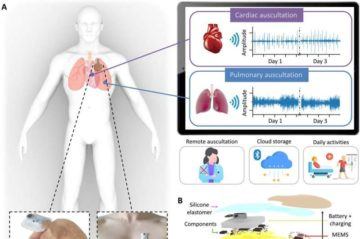From Phys.Org:
 Digital stethoscopes provide better results compared to conventional methods to record and visualize modern auscultation. Current stethoscopes are bulky, non-conformal, and not suited for remote use, while motion artifacts can lead to inaccurate diagnosis. In a new report now published in Science Advances, Sung Hoon Lee and a research team in engineering, nanotechnology, and medicine at the Georgia Institute of Technology, U.S., and the Chungnam National University Hospital in the Republic of Korea described a class of methods to offer real-time, wireless, continuous auscultation. The devices are part of a soft wearable system for quantitative disease diagnosis across various pathologies. Using the soft device, Lee et al detected continuous cardiopulmonary sounds with minimal noise to characterize signal abnormalities in real-time.
Digital stethoscopes provide better results compared to conventional methods to record and visualize modern auscultation. Current stethoscopes are bulky, non-conformal, and not suited for remote use, while motion artifacts can lead to inaccurate diagnosis. In a new report now published in Science Advances, Sung Hoon Lee and a research team in engineering, nanotechnology, and medicine at the Georgia Institute of Technology, U.S., and the Chungnam National University Hospital in the Republic of Korea described a class of methods to offer real-time, wireless, continuous auscultation. The devices are part of a soft wearable system for quantitative disease diagnosis across various pathologies. Using the soft device, Lee et al detected continuous cardiopulmonary sounds with minimal noise to characterize signal abnormalities in real-time.
The team conducted a clinical study with multiple patients and control subjects to understand the unique advantage of the wearable auscultation method, with integrated machine learning, to automate diagnoses of four types of disease in the lung, ranging from a crackle, to a wheeze, stridor and rhonchi, with 95% accuracy. The soft system is applicable for a sleep study to detect disordered breathing and to detect sleep apnea.
More here.
